- Home
- »
- Pharmaceuticals
- »
-
Basal Cell Carcinoma Treatment Market Size Report, 2030GVR Report cover
![Basal Cell Carcinoma Treatment Market Size, Share & Trends Report]()
Basal Cell Carcinoma Treatment Market (2024 - 2030) Size, Share & Trends Analysis Report By Treatment Type (Surgery, Radiotherapy, Topical Chemotherapy, Intralesional Injections, Oral Medications, Chemical Peeling Treatment), By Region, And Segment Forecasts
- Report ID: GVR-4-68040-170-1
- Number of Report Pages: 158
- Format: PDF
- Historical Range: 2018 - 2023
- Forecast Period: 2024 - 2030
- Industry: Healthcare
- Report Summary
- Table of Contents
- Segmentation
- Methodology
- Download FREE Sample
-
Download Sample Report
Market Size & Trends
The global basal cell carcinoma treatment market size was estimated at USD 2.96 billion in 2023 and is projected to grow at a CAGR of 10.44% from 2024 to 2030. The market's growth is attributed to an increase in the prevalence of chronic diseases, such as Basal Cell Carcinoma (BCC), which is expected to impel the demand for drugs used for treatment. According to an American Cancer Society report published in 2023, skin cancers are the most frequent type of cancer in the U.S., accounting for many cases, which include basal and squamous cell skin cancers. Around 5.4 million cases of basal and squamous cell skin cancer are reportedly detected in the U.S. each year (affecting approximately 3.3 million individuals, as some people have more than one).
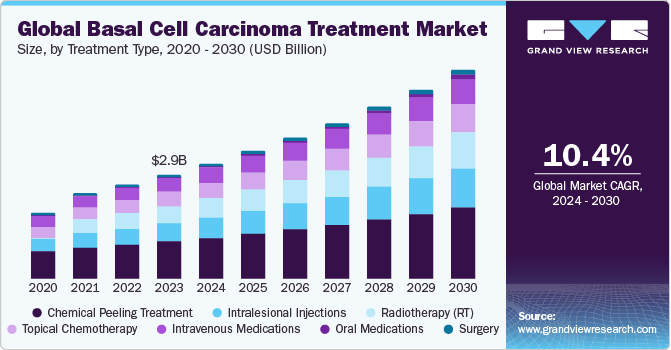
In addition, eight out of ten of these malignancies involve basal cells, and sometimes squamous cells are involved. This is most likely the result of increased sun exposure, longer lifespans, and improved skin cancer detection. Thus, the rising basal cell carcinoma population is anticipated to grow BCC treatment adoption.
Although BCCs are thought to be quite benign, they have the potential to be extremely dangerous. BCCs can spread to other organs and systems, such as the kidney, lungs, nerves, or lymph nodes, if left untreated. Severe disfigurement may ensue from their surgical removal. Hence, several treatment options other than surgery are available in the market, including topical chemotherapy, Radiotherapy (RT), intralesional injections, oral medications, chemical peeling treatment, and others. Thus, growing awareness about these treatments and their benefits among physicians & patients is expected to drive market growth over the forecast period.
Nowadays, photodynamic treatment, radiation therapy, and surgical removal of the tumor with a margin of healthy tissue are used to treat skin malignancies like basal cell carcinoma. Treatment with conventional chemotherapy is not very effective, particularly when treating cancer. Therefore, a novel treatment strategy must be developed for the effective management of basal cell carcinoma cases, regardless of their advanced stages. A growing number of in vivo and in vitro research indicates the potential of nanotechnology as a BCC cancer treatment. The development of drug delivery systems with higher biological efficacy at lower doses and fewer adverse effects is made possible by nanomaterials & nanocarriers. The anticancer medications incorporated into these nanoparticles can be delivered directly and precisely to cancer cells, where they can show their greatest impact due to the small size and surface properties of nanomaterials.
Market Concentration & Characteristics
There has been substantial innovation in the treatment of basal cell carcinoma, with many ongoing research and development initiatives aiming at improving the usage, effectiveness, and accessibility of basal cell cancer medicines. Some of these recent major technological advancements in basal cell treatment include the use of Artificial Intelligence (AI), photodynamics, and machine learning, and teledermatology for the diagnosis & management of BCC.
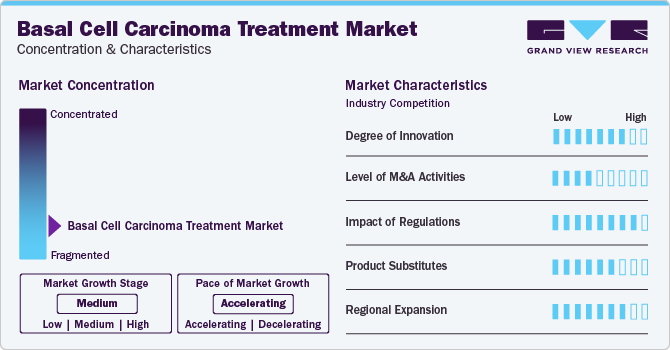
Key companies in the market participate in mergers and acquisitions to improve their market position. This allows businesses to enhance proficiency, diversify their product offerings, and boost business capacities. For instance, in July 2022, Regeneron Pharmaceuticals, Inc. acquired Sanofi’s share in Libtayo (cemiplimab), offering Regeneron Pharmaceutical with exclusive worldwide development, manufacturing, and commercialization rights to the drug originally discovered in Regeneron’s laboratories. This open new opportunity for Libtayo to sale across the world.
Regulatory trends in the market involve stringent regulations for the approval of innovative treatments. The key focus areas are immunotherapies, chemotherapy, and accelerated pathways for promising drugs. Streamlined regulations aim to enhance access to cutting-edge treatments while maintaining patient safety and well-being.
The market is witnessing notable technological trends, including the development of new targeted therapies & immunotherapy and personalized medicine. These advancements promise more effective and personalized treatment options, offering hope for improved outcomes & better quality of life for basal cell carcinoma patients. Growing collaborations among pharmaceutical companies are expected to boost the development of novel technologies.
Increase in skin cancer cases, improvements in medical technology, and easier access to healthcare are all expected to fuel significant expansion in the market in various regions of the world. Stakeholders, such as policymakers, academics, and healthcare providers, are supported in taking advantage of these developments to improve treatment outcomes and increase market share.
Treatment Type Insights
The surgery segment dominated the market and accounted for a revenue share of 35.86% in 2023. This can be attributed to advancements in surgical techniques, the development of minimally invasive procedures, and a heightened awareness of skin cancer, leading to early diagnosis & treatment. Furthermore, patients primarily choose surgeries due to their high success rates and proven efficacy, thus stimulating the demand for effective surgical treatments. According to an article published in MedStar Health in 2023, in the U.S., about 850,000 Mohs surgeries are performed yearly. The high volumes of surgeries conducted for the treatment of BCC support the growth of this market. Thus, the growing demand for surgeries for the treatment of basal cell carcinoma is expected to drive market growth.
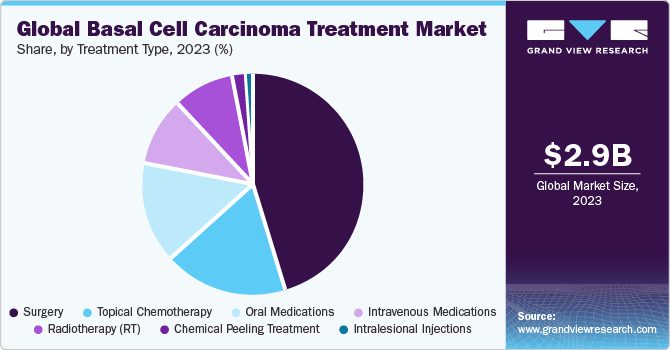
The intralesional injections segment is projected to grow at the fastest CAGR from 2024 to 2030. For patients with BCC, intralesional injections have emerged as a significant treatment option, especially for those who are looking for nonsurgical options. With the possibility of fewer systemic adverse effects, these injections allow focused therapy by delivering therapeutic molecules straight into the tumor. Drugs used include bleomycin, fluorouracil, methotrexate, chloroquine, rituximab, and interferons. Developing and commercializing a novel intralesional injection is anticipated to drive market growth over the forecast period.
Regional Insights
North America basal cell carcinoma treatment market accounted for revenue share of 59.49% in 2023. Its growth can be attributed to the increase in BCC prevalence, advancements in treatment technologies & methods, heightened awareness of skin cancer and its risks, and a growing emphasis on early detection & preventive care. According to the International Agency for Research on Cancer (IARC), in 2022, North America reported 531,423 cases of Nonmelanoma Skin Cancer (NMSC). Increased exposure to Ultraviolet (UV) radiation from natural sunlight and artificial sources, such as tanning beds, has contributed to BCC prevalence.
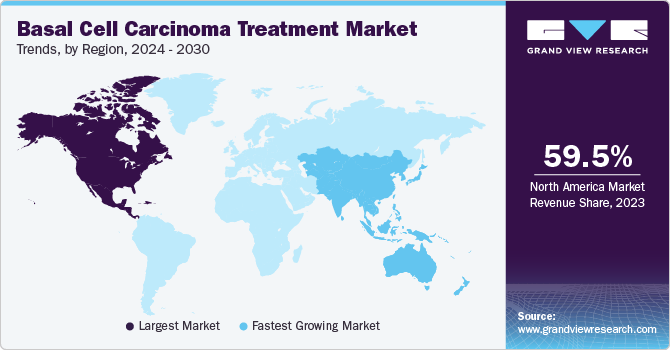
U.S. Basal Cell Carcinoma Treatment Market Trends
The basal cell carcinoma treatment market in the U.S. dominated the North American region in 2023. The increasing cases of basal cell carcinoma in the country are expected to support market growth. According to the International Agency for Research on Cancer (IARC), the U.S. reported 475,093 cases of Non-melanoma skin cancer (NMSC) IN 2022. Basal cell carcinoma accounts for about 80% of all non-melanoma skin cancer. Thus, rising NMSC populations are anticipated to drive demand for basal cell carcinoma treatment in the U.S. market.
Europe Basal Cell Carcinoma Treatment Market Trends
The Europe basal cell carcinoma treatment market was a lucrative region in this industry. The aging population in the region is mainly susceptible to BCC due to cumulative sun exposure over the years. As the proportion of older adults increases, the demand for BCC treatments is also expected to rise. Innovations in treatment technologies, including advanced surgical techniques, radiation therapy, and novel topical and systemic medications, drive the market.
The basal cell carcinoma treatment market in the UK is projected to expand in the future due to the increase in the prevalence of NMSC, particularly BCC, which creates a direct demand for effective treatments, driving innovation and R&D. Skin cancer cases in the country, including BCC, have surged to record levels, with approximately 17,500 cases diagnosed annually. This supports the growth of the market for BCC treatments and leads to improved patient outcomes, contributing to the overall effort in cancer care and management in the UK.
France basal cell carcinoma treatment market is positively influenced by developments in targeted therapies, immunotherapies, and topical treatments that are improving the efficacy and safety of BCC treatments. For instance, the introduction of vismodegib (Erivedge) and sonidegib (Odomzo), hedgehog pathway inhibitors, provided new treatment options for advanced cases of BCC.
The basal cell carcinoma treatment market in Germany is expected to grow from 2024 to 2030. Skin cancer is a prevalent issue in Germany, with approximately 300,000 new cases reported each year. The majority of these cases are non-melanocytic types, such as basal cell and squamous cell carcinomas. However, malignant melanoma, although less common, accounts for about 75% of the approximately 4,000 skin cancer-related deaths annually in Germany.
Asia Pacific Basal Cell Carcinoma Treatment Market Trends
Asia Pacific basal cell carcinoma treatment market is anticipated to witness the fastest growth from 2024 to 2030. This growth can be attributed to several factors, including an increased awareness of the disease, improved diagnostic techniques, and a rising incidence of skin cancers due to aging populations & changing environmental conditions. The incidence of NMSC in East and Southeast Asia is lower compared to North America & Europe.
The basal cell carcinoma treatment market in China is significantly growing attributed to several factors, reflecting the broader dynamics within the healthcare sector and the increasing focus on dermatological conditions.
The Japan basal cell carcinoma treatment market is expected to grow from 2024 to 2030. The incidence of skin cancer is growing worldwide, mainly among the elderly population. In Japan, the rapidly growing aging population has led to a significant increase in the number of BCC patients. To address this, Casio Computer, a Japanese electronics manufacturer, planned to introduce its skin cancer detection devices in international markets, targeting countries with higher disease prevalence.
Latin America Basal Cell Carcinoma Treatment Market Trends
Latin America basal cell carcinoma treatment market is expected to grow rapidly. The growth in the region is attributed to the increase in the prevalence of various types of cancer in the region. Several surveys by various government and nonprofit organizations revealed that overall cancer mortality in Latin America is almost twice that of high-income countries.
The basal cell carcinoma treatment market in Brazil is expected to grow from 2024 to 2030. Brazil has the largest population in Latin America. Skin cancer, including BCC, is the most common type of cancer in Brazil, accounting for 25% of all cancer cases. Recognizing the urgent need for reliable instrumentation for early detection of skin cancer, INESC P&D Brazil initiated a research line in this area.
Middle East & Africa Basal Cell Carcinoma Treatment Market Trends
MEA basal cell carcinoma treatment market was identified as a lucrative region in this industry. The market in this region is driven by the increasing incidence of skin cancer, rising awareness about early detection, advancements in diagnostic technologies, and growing initiatives for skin cancer prevention & control. The rise in skin cancer incidence can be attributed to changing lifestyles, insufficient sun protection measures, and environmental factors.
The market for basal cell carcinoma treatment in Saudi Arabia is influenced by various factors, including technological advancements, increasing awareness about skin cancer, and the rapidly aging population. The field of dermatology and oncology has witnessed significant technological advancements in diagnostic tools and techniques for detecting skin cancer at early stages.
Key Basal Cell Carcinoma Treatment Company Insights
Some key players are extensively implementing strategies to sustain their market positions, which is enhancing competition in the market. Companies are implementing various strategies including distribution agreements for geographic expansion and indication expansion for already approved products.
Taro Pharmaceuticals Ltd, Accord Healthcare Limited (Subsidiary of Intas Pharmaceuticals), and Almirall, S.A. are some emerging players in the market. These companies focus on achieving funding support from government bodies and healthcare organizations aided with novel launches to capitalize on untapped avenues.
Key Basal Cell Carcinoma Treatment Companies:
The following are the leading companies in the basal cell carcinoma treatment market. These companies collectively hold the largest market share and dictate industry trends.
- Bausch Health Companies Inc.
- Almirall, S.A.
- Genentech, Inc. (Subsidiary of F. Hoffmann-La Roche AG)
- Novartis AG
- Regeneron Pharmaceuticals Inc.
- Dr Reddy’s Laboratories
- Taro Pharmaceuticals Ltd
- Accord Healthcare Limited (Subsidiary of Intas Pharmaceuticals)
Recent Developments
-
In February 2024, ITN Business and Accord Healthcare are collaborating to celebrate World Cancer Day 2024 through a news-style program. This program helps in raising awareness of cancer and drives demand for treatment across worldwide.
-
In November 2023, Almirall S.A. and Absci Corporation partnered on medication research to develop & market AI-designed treatments to combat debilitating and chronic dermatological illnesses. The collaboration represents a significant advancement in AI drug creation, combining Almirall’s dermatological knowledge with Absci’s Integrated Drug Creation platform to offer potentially life-changing medications to patients.
-
In October 2023, Almirall S.A. opened its eighth request for research proposals focusing on important pathological mechanisms that may serve as the foundation for ground-breaking treatments for skin conditions through AlmirallShare, its open innovation platform.
Basal Cell Carcinoma Treatment Market Report Scope
Report Attribute
Details
Market size value in 2024
USD 3.27 billion
Revenue forecast in 2030
USD 5.93 billion
Growth rate
CAGR of 10.44% from 2024 to 2030
Actual data
2018 - 2023
Forecast period
2024 - 2030
Quantitative units
Revenue in USD million/billion and CAGR from 2024 to 2030
Report coverage
Revenue forecast, company ranking, competitive landscape, growth factors, and trends
Segments covered
Treatment type, region
Regional scope
North America; Europe; Asia Pacific; Latin America; MEA
Country scope
U.S.; Canada; UK; Germany; France; Italy; Spain; Denmark; Sweden; Norway; China; Japan; India; South Korea; Australia; Brazil; Mexico; Argentina; South Africa; UAE; Kuwait; Saudi Arabia
Key companies profiled
Bausch Health Companies Inc.; Almirall, S.A.; Genentech, Inc. (Subsidiary of F. Hoffmann-La Roche AG); Novartis AG; Regeneron Pharmaceuticals Inc.; Dr Reddy’s Laboratories; Taro Pharmaceuticals Ltd; Accord Healthcare Limited (Subsidiary of Intas Pharmaceuticals)
Customization scope
Free report customization (equivalent up to 8 analysts working days) with purchase. Addition or alteration to country, regional & segment scope.
Pricing and purchase options
Avail customized purchase options to meet your exact research needs. Explore purchase options
Global Basal Cell Carcinoma Treatment Market Report Segmentation
This report forecasts revenue growth at global, regional, and country levels and provides an analysis of the latest industry trends in each of the sub-segments from 2018 to 2030. For this study, Grand View Research has segmented the global basal cell carcinoma treatment market report based on treatment type, and region:
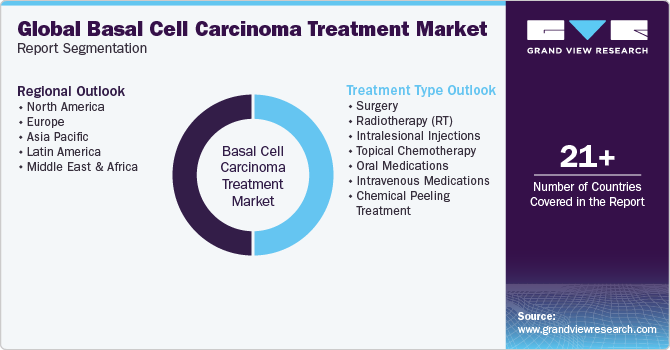
-
Treatment Type Outlook (Revenue, USD Million, 2018 - 2030)
-
Surgery
-
Mohs surgery
-
Surgical Excision
-
Electrodesiccation and Curettage (ED&C)
-
-
Radiotherapy (RT)
-
Intralesional injections
-
Topical chemotherapy
-
5-fluorouracil (5-FU)
-
Tirbanibulin (Klisyri)
-
Imiquimod (Zyclara)
-
-
Oral Medications
-
Vismodegib (Erivedge)
-
Sonidegib (Odomzo)
-
-
Intravenous Medications
-
Chemical peeling treatment
-
-
Regional Outlook (Revenue, USD Million, 2018 - 2030)
-
North America
-
U.S.
-
Canada
-
Mexico
-
-
Europe
-
Germany
-
UK
-
France
-
Italy
-
Spain
-
Denmark
-
Sweden
-
Norway
-
-
Asia Pacific
-
China
-
Japan
-
India
-
South Korea
-
Australia
-
Thailand
-
-
Latin America
-
Brazil
-
Argentina
-
-
Middle East and Africa (MEA)
-
South Africa
-
Saudi Arabia
-
Kuwait
-
UAE
-
-
Frequently Asked Questions About This Report
b. Key factors that are driving the market growth include an increase in the prevalence of chronic diseases, such as Basal Cell Carcinoma (BCC), advancements in surgical techniques, and development of minimally invasive procedures
b. The global basal cell carcinoma treatment market size was estimated at USD 2.96 billion in 2023 and is expected to reach USD 3.27 billion in 2024.
b. The global basal cell carcinoma treatment market is projected to grow at a compound annual growth rate (CAGR) of 10.44% from 2024 to 2030 to reach USD 5.93 billion by 2030.
b. The surgery segment dominated the market and accounted for a share of 35.86% in 2023. This can be attributed to advancements in surgical techniques, development of minimally invasive procedures, and a heightened awareness of skin cancer, leading to early diagnosis & treatment
b. Some key players operating in the basal cell carcinoma treatment market include Bausch Health Companies Inc., Almirall, S.A., Genentech, Inc. (Subsidiary of F. Hoffmann-La Roche AG), Novartis AG, Regeneron Pharmaceuticals Inc., Dr Reddy’s Laboratories, Taro Pharmaceuticals Ltd, Accord Healthcare Limited (Subsidiary of Intas Pharmaceuticals)
Share this report with your colleague or friend.
Need a Tailored Report?
Customize this report to your needs — add regions, segments, or data points, with 20% free customization.

ISO 9001:2015 & 27001:2022 Certified
We are GDPR and CCPA compliant! Your transaction & personal information is safe and secure. For more details, please read our privacy policy.
Trusted market insights - try a free sample
See how our reports are structured and why industry leaders rely on Grand View Research. Get a free sample or ask us to tailor this report to your needs.










